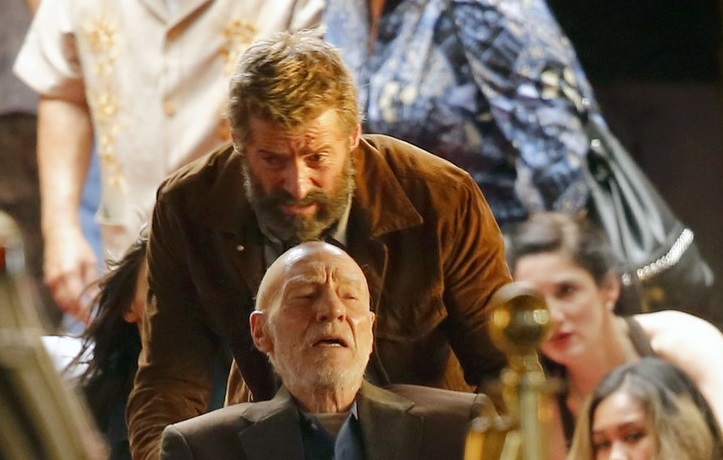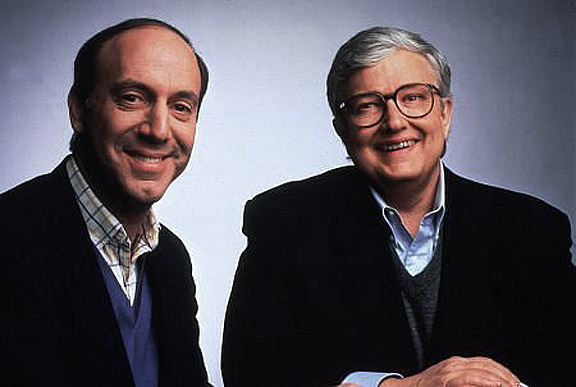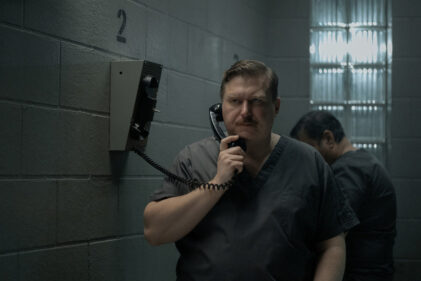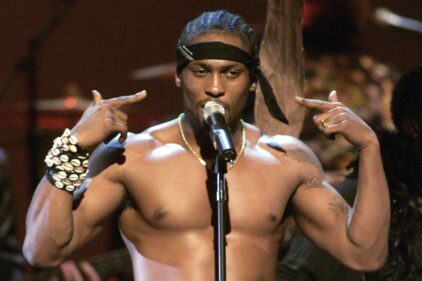My grandfather lived eighteen months after my grandmother died of bone cancer. He spent the last 18 months of his life wasting away in the Retirement Inn in Dallas, Texas. My mother used to drop me off there to spend the day with him every Saturday and sometimes on Sunday. I was a sophomore in high school. I don’t know if my mother really understood how bad things were getting or how much care he required. I used to help him take a shower. First I’d help him take his clothes off, then I’d walk him to the shower, then I’d stand there while he stood under the water, and then finally I’d help him towel off. He needed help with all this because he’d had a stroke and couldn’t really lift his arms above his shoulders. I helped him to to the bathroom, too. Sometimes if he was really tired or was having issues with his arms, I’d wipe him.
I don’t remember when, exactly, that the dementia hit him. But it got steadily worse during his last six months. Sometimes he couldn’t remember my name. Other times he’d call me Jake, which was the name of one of his brothers. And there were a few times when I knew that he had totally forgotten who I was, and was pretending he remembered because he didn’t want to be rude. Grandpa was a gentleman that way.
He became more sour and maudlin near the end. He used to rant about how his wife would still be alive if the doctors hadn’t given her “the wrong medicine.” It’s possible that he was talking about the chemotherapy that my grandmother endured to stave off the effects of bone cancer, but I was sixteen, so I wasn’t able to think metaphorically yet. I just thought he was lying to himself about how his wife died. I let him say whatever he wanted to say, no matter how ridiculous it sounded to me, until one day I snapped. “It wasn’t the wrong medicine, you idiot, it was bone cancer,” I yelled at him. “Bone cancer killed her. It ate her bones away the way termites eat wood. You saw her wasting away. You got the reports from the doctor. Shut up about the wrong medicine! Just shut up!”
He cursed me out. I’d never heard profanity like that pour out of the old man before. “Damn” or “hell” were usually about as far as he’d go. He was furious. Red in the face. He even tried to get up out of his chair so he could hit me, but he didn’t have the strength, so he flopped back down in it and started to cry.
I felt nauseous and ashamed. How could I talk to him that way? I went over to him and hugged him.
“I’m sorry,” he said. “You know I love you, buddy boy.”
That was what he called me, Buddy boy.
Buddy for short.
I’d stowed these memories away for years. They all came rushing back watching Logan (Hugh Jackman) take care of Professor Charles Xavier (Patrick Stewart), who’s ninety-something years old, confined to a wheelchair, and suffering seizures that have to be treated regularly with medication, otherwise he’ll psychically lash out and cause great damage to the world.
Sometimes Xavier forgets to take his medicine. There are times when he doesn’t recognize Logan. There are times when he gets short-tempered with Logan and has to apologize. On the other side, there are times when Logan loses his cool and snaps at Xavier. He feels a responsibility towards him, strong enough that it puts the lie to Logan’s self-image as a damaged, worthless man who only brings harm to others.
Logan understood teenage me, visiting my grandfather in the retirement home.
It also understood fortysomething me, trying to be a single father and not completely screw things up.
And there were moments when I saw aspects of myself in Laura (Dafne Keen), the girl that Logan protects. Laura is a gifted child who has rage issues. I had a touch of that. And I shared her sense of being completely alone in life, left to my own devices, to sink or swim, from an early age.

These are not the kinds of associations that big budget superhero films summon on the regular. Once in a while, for a scene or two. Or in stray moments.
But for the most part, the Marvel and DC model isn’t into that kind of thing. It’s too risky.
Most contemporary superhero movies aren’t movies, but movie-flavored products. They tend to be just good enough that you come out of the theater telling your friends “It was actually pretty good,” but not so good that you walk around obsessing over them. And then a couple of years later the movie blurs into the endless slipstream of franchise continuity, trailers and stingers, wisecracks and fights. The entire mentality of these movie-flavored products is superficial, deliberately so. The skating-the-surface approach is part of the design, the marketing, the architecture. And people like it. They keep paying for it. That means it’s working. And there’s no compelling reason to mess with something that’s working.
Christopher Nolan’s “Batman” trilogy doesn’t have any current equivalent in post-Marvel Comics Universe superhero cinema. I had problems with them when they first came out—no point getting into all that now, though, because with each passing year the Nolan Batmans look more like actual popular art compared to the next wave of superhero movies. Nolan’s Batman movies are too peculiar and personal, too clearly the work of a possibly demented control freak who needs things to be done in a certain way, to exist in the current economic climate. Modern Marvel and DC films aren’t really movies in the sense of “cinema” or “art,” they’re $200 million widgets that are either intended to fit together with other widgets to form a master narrative or sit adjacent to the master narrative (a la “Ant-Man,” the superhero movie equivalent of a sorbet) without jamming the gears and grinding the money-printing machine to a halt.
When the newer superhero films go for sincerity, they often achieve “sincerity” instead. On purpose. And they don’t stay in that mode for long regardless, because the audience has been conditioned by Marvel and DC not to want real movies, works that dig deep and put you off-balance, unsure what to think or whether to resist a feeling or lean into it. They’ve been conditioned to want two-plus hours of sound and light with some jokes and a bit of fan service. The most purportedly “adult” of the films, the “R”-rated smash “Deadpool,” was only adult in the sense that little kids weren’t allowed to see it on their own because of the “R” rating. The hero is a teenager’s idea of an adult man living with a death sentence, just as the title characters in “Batman vs. Superman” are a teenager’s idea of emotionally damaged outsiders acting out their rage on each other and the world.
Logan in “Logan” is the real deal. His eyes have that wet, grey look that you see in people dealing with late-stage cancer. He lives in a world where you take care of father figures who forget to take their medicine and occasionally curse you out in frustration or fail to recognize you. One of the funniest and most affecting scenes is where Logan helps Xavier use the bathroom, and we see Xavier’s bony ankles peeking beneath the stall while he talks to Logan, who’s standing outside facing away so he won’t have to watch the old man do his business.
I had no idea that a Marvel movie could affect me the way “Logan” did.
I almost hesitate to type that because I don’t want anybody to get the idea that this is a perfect movie, or a masterpiece of any kind. I don’t want to oversell it.
James Mangold (who directed Jackman in his last, pretty good solo Wolverine outing, which was simply titled “The Wolverine“) has made no secret of the fact that he drew inspiration from classic westerns, including “Shane,” which is quoted directly and perhaps too liberally at the end, and “Unforgiven” and “The Shootist” and other movies about aging or ill gunfighters drawn into one more crusade. And there are moments, particularly near the end, when the film channels “The Outlaw Josey Wales,” a story about a war veteran who keeps telling everyone he prefers to be alone yet keeps accumulating responsibilities, and spends the final act of the movie in a commune in the wilderness.
“Logan” isn’t on the level of any of those movies. The action, while shocking, scary and sometimes stirring, grows repetitious. And even though this is already a long picture (two hours, 17 minutes) there were times when I wouldn’t have minded more development of key set-pieces, such as the stretch near the end at the mountaintop refuge, where it momentarily seems as if Logan is about to assume the same exalted place that Xavier once occupied at his “special needs” school.
But right now I don’t really feel like listing the ways in which “Logan” could have been better, because it has integrity and a big heart and it moved me.
This is a film where people try to drive through chain-link fences and their cars get snarled up. It’s a film where old men forget to take their medicine and superheroes angrily crank the ignition on trucks that don’t start. It’s a superhero film that has things to say, smart things, about the impact of mechanization on everyday lives, and the way that late capitalist society encourages people to use junk food and medicine to regulate their moods and manage the pain of living.
There’s even a sub-theme—a touch too meta but still fascinating—about the difference between this kind of film and the typical Marvel or DC film. Where the former is about life as it is, daily frustrations and humiliations and all, the latter is escapist or aspirational. It’s about how we wish life could be, and it often serves up wish fulfillment fantasies, cool images of cool people doing cool things and living in Gothic mansions and cliff-side bachelor pads, tearing around the city in Batmobiles or soaring over it with rocket packs.
In contrast, the characters in “Logan” live day by day and don’t take proper care of themselves because they’re depressed or overworked. The film’s main settings are farmhouses, hotel rooms, motel rooms, convenience stores, and the front seats of vehicles. Logan looks like hell, drinks to numb his pain, and is so disheveled that you can imagine what he must smell like. And yet I didn’t find the movie to be depressing at all, just more real than I expected. Not fake-real, as in “edgy.” I mean really real. As in “drama.” It’s filled with people like the people you actually know, or have known. They just happen to have superpowers.
The film’s attitude toward the aspirational or escapist kind of comic isn’t condescending, though. “Logan” integrates that kind of comic into the fabric of the story, as a form of illustrated mythology experienced by Laura, who badly needs something like that in her life. Logan sees through the exaggeration of her comics and tells her that even when parts of those stories are true, there’s a lot more that’s made up or exaggerated.
At the same time, however, all through the film Logan is constantly shown rejecting the pleas of Xavier and Laura to rise to the level of his own best self—and you think about that in relation to the comics Laura reads, you see that the film is commenting (subtly and with humility) on the idea of comics as inspirational texts, allegories that have a totemic power similar to narratives found in religion, mythology, or self-help books. Truth, justice and the American way. With great power comes great responsibility. Et cetera.
The movie draws a connecting line from the “real” world of “Logan,” dirty and despairing and often dull as it can be, and the more hopeful world of the pre-graphic-novel type of comic. Then it draws a third connecting line to the Western, the genre that most inspired the filmmakers here. Not for nothing is “Logan” built around references to “Shane. But it’s a much more complex work than “Shane.” (Almost everything is.) You could say it’s simultaneously about how necessary “Shane” is and how nobody can actually be Shane.
Beyond that, “Logan” is the first emotionally credible and recognizably real-world superhero picture to come along since “Unbreakable”—which was made eight years before the paradigm-revising “Iron Man,” and which therefore doesn’t feel like a superhero movie in the contemporary sense of the phrase. It feels like an M. Night Shyamalan film, which is really what I want from a superhero movie, and from any movie. Films like “Unbreakable” and “Logan”—and for that matter, the exceedingly odd “The Hulk” and “Superman Returns,” which were rejected by mass audiences—feel like real auteur statements, of a sort that the Marvel and DC “expanded universe” model can no longer permit unless it runs on TV, where the variety of available moods and styles is more wide ranging, and the financial stakes are less dire. (“Legion,” “Jessica Jones” and “Luke Cage” have so much more personality than almost any theatrical film released by Marvel or DC that it seems unsporting to put them side by side—but that’s a subject for a whole other piece.)
I liked the intimacy of the film. There are no gigantic hovercrafts crashing into buildings, no world-destroying plasma cannons hovering over cities. The universe is not at stake. The future of humankind is at stake, yes, but not right this second. Laura represents the future of the mutants, but we don’t know exactly what that will mean in the long-term, and whatever it means, it’s not as important to us as what Laura means to Logan and what Logan means to Laura and what Xavier means to both of them.
During some scenes towards the middle of the film, they really do feel like a family. It’s as if a daughter, her father and her grandfather are traveling together. That lie that Xavier tells to the family that invites them to dinner isn’t really a lie. This is another way in which “Logan” rings true. The relationship configurations you create to replace traditional families are often stronger and more nurturing than traditional families, because you chose them, you committed to them.
There’s a lot going on in this film, to put it mildly. It and “Get Out” are proving that it is still possible to make mainstream genre films that are principled, multilayered and distinctive, and still have large numbers of people be interested in paying to see them in a theater.
Which is not, of course, the same thing as saying that the film is going to please everybody. I saw “Logan” on a Saturday night in Bay Ridge. There was some grumbling as the final credits rolled. One audience member yelled “That was bullshit!” at the screen. A young woman said angrily to her date, “How could they just kill him? What the hell is that? That’s not an ending.” I chalked this up to Marvel and DC conditioning audiences not to want a movie that leaves them feeling melancholy or uneasy, thinking about their own regrets and mistakes and what they’re going to do between now and when they die. But it was still disheartening.
But I also understand that this is not a universal reaction—that the Cinemascore for the film is good, and a lot of people like it. I hope viewers talk it up enough to give the film some legs at the box office, and make works like “Logan” as attractive to studios as the latest widget. I’d like to see more superhero movies like “Logan.” Real movies, not movie-flavored product. Movies that show you fantastic individuals engaged in recognizable struggles while holding up a mirror to the audience and insisting they take a good, long look.












